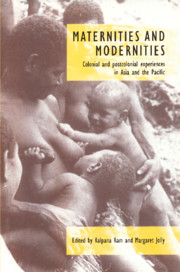Book contents
- Frontmatter
- Contents
- List of illustrations
- Notes on contributor
- Acknowledgements
- Map 1 Location of countries and regions in Asia and the Pacific discussed in this volume
- Introduction Colonial and postcolonial plots in histories of maternities and modernities
- 1 Shaping reproduction: maternity in early twentieth-century Malaya
- 2 Modernizing the Malay mother
- 3 ‘Good wives and mothers’ or ‘dedicated workers’? Contradictions of domesticity in the ‘mission of sisterhood’, Travancore, south India
- 4 Maternity and the story of enlightenment in the colonies: Tamil coastal women, south India
- 5 The dai and the doctor: discourses on women's reproductive health in rural Bangladesh
- 6 Other mothers: maternal ‘insouciance’ and the depopulation debate in Fiji and Vanuatu, 1890–1930
- 7 Just add water: remaking women through childbirth, Anganen, Southern Highlands, Papua New Guinea
- 8 From sisters to wives: changing contexts of maternity on Simbo, Western Solomon Islands
- Epilogue Maternal experience and feminist body politics: Asian and Pacific perspectives
- Index
1 - Shaping reproduction: maternity in early twentieth-century Malaya
Published online by Cambridge University Press: 06 July 2010
- Frontmatter
- Contents
- List of illustrations
- Notes on contributor
- Acknowledgements
- Map 1 Location of countries and regions in Asia and the Pacific discussed in this volume
- Introduction Colonial and postcolonial plots in histories of maternities and modernities
- 1 Shaping reproduction: maternity in early twentieth-century Malaya
- 2 Modernizing the Malay mother
- 3 ‘Good wives and mothers’ or ‘dedicated workers’? Contradictions of domesticity in the ‘mission of sisterhood’, Travancore, south India
- 4 Maternity and the story of enlightenment in the colonies: Tamil coastal women, south India
- 5 The dai and the doctor: discourses on women's reproductive health in rural Bangladesh
- 6 Other mothers: maternal ‘insouciance’ and the depopulation debate in Fiji and Vanuatu, 1890–1930
- 7 Just add water: remaking women through childbirth, Anganen, Southern Highlands, Papua New Guinea
- 8 From sisters to wives: changing contexts of maternity on Simbo, Western Solomon Islands
- Epilogue Maternal experience and feminist body politics: Asian and Pacific perspectives
- Index
Summary
Defining maternity
Over the past decade, the literature on maternity and motherhood has expanded dramatically. This has occurred not as a consequence or reflection of medical professional and state concern for maternal (and infant) health, but rather in the context of social, economic and ideological changes within industrialized societies, resulting in changes in the institutional settings of motherhood, in government policies towards reproduction and in the social meanings ascribed to it (Crouch and Manderson 1993). Concurrently, feminist scholarship has turned from the initial problem of the role of maternity in denning femaleness to interrogating its place in the social relations between men and women and among women, the meanings with which maternity as experience and status are imbued, and the tensions and accommodations of reproduction and production institutionally and personally in different places and under different systems of production. A driving concern has been to understand the macro-processes involved in maternity and motherhood, and the links between biology, psychology and culture, as addressed and problematized by writers such as Martin (1987) and Butler (1990).
This has resulted in numerous studies into the behaviours, practices and values of maternity (childbearing) and motherhood – child spacing, experiences of pregnancy, childbirth, confinement, breast-feeding, sexual practice and abstinence during pregnancy and lactation, child care, the medicalization of childbirth and mothering, foetal diagnosis and monitoring, in-vitro fertilization, infertility, ‘late’ or older motherhood, single motherhood, surrogacy, the choice not to have children, miscarriage, abortion, fertility control, postnatal depression- a list that might be endless, as reproduction and motherhood are documented, scrutinized and analysed (see e.g. Davis-Floyd 1992; Hull and Simpson 1985; Martin 1987; Michaelson 1988; Mitford 1992; Oakley 1980; Stanworth 1987).
- Type
- Chapter
- Information
- Maternities and ModernitiesColonial and Postcolonial Experiences in Asia and the Pacific, pp. 26 - 49Publisher: Cambridge University PressPrint publication year: 1998
- 4
- Cited by



